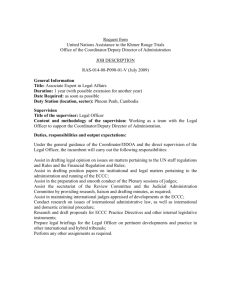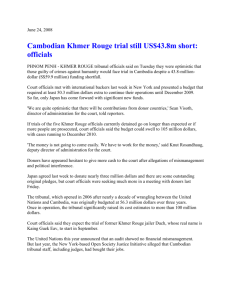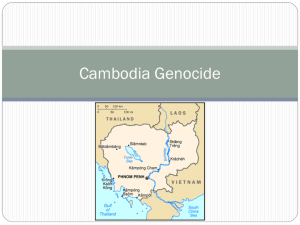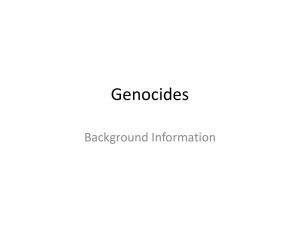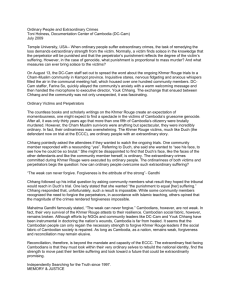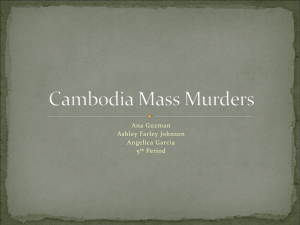www.XtremePapers.com
advertisement
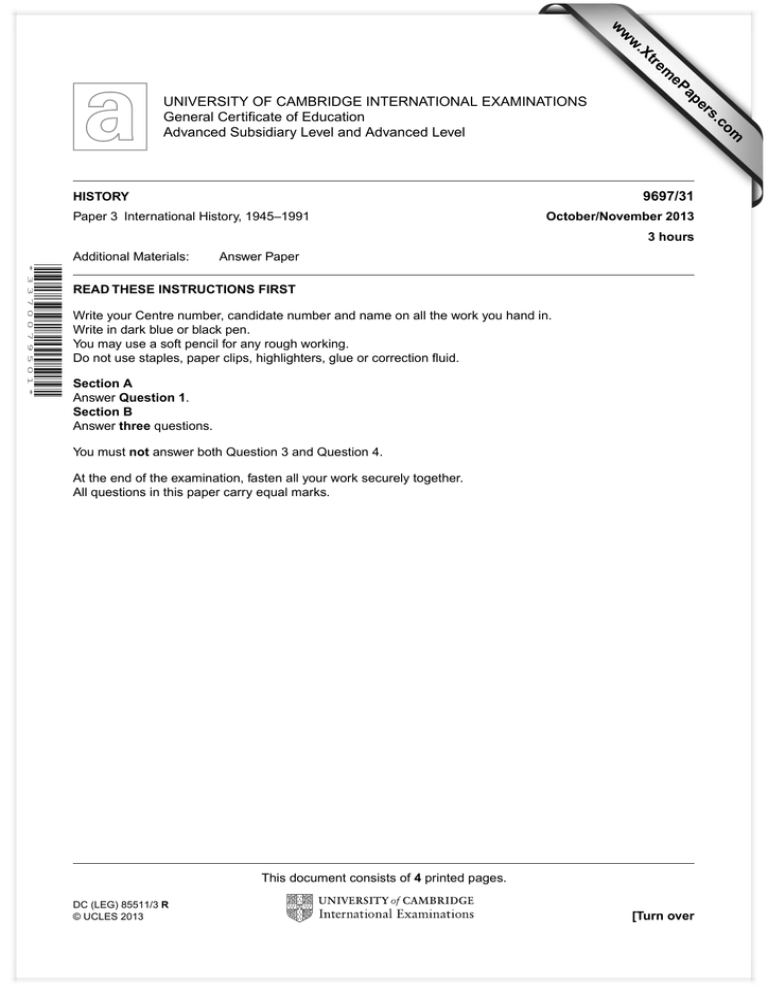
w w ap eP m e tr .X w om .c s er UNIVERSITY OF CAMBRIDGE INTERNATIONAL EXAMINATIONS General Certificate of Education Advanced Subsidiary Level and Advanced Level 9697/31 HISTORY Paper 3 International History, 1945–1991 October/November 2013 3 hours Additional Materials: Answer Paper * 3 3 7 0 0 7 9 5 0 1 * READ THESE INSTRUCTIONS FIRST Write your Centre number, candidate number and name on all the work you hand in. Write in dark blue or black pen. You may use a soft pencil for any rough working. Do not use staples, paper clips, highlighters, glue or correction fluid. Section A Answer Question 1. Section B Answer three questions. You must not answer both Question 3 and Question 4. At the end of the examination, fasten all your work securely together. All questions in this paper carry equal marks. This document consists of 4 printed pages. DC (LEG) 85511/3 R © UCLES 2013 [Turn over 2 Section A: The Development of the United Nations, 1945–1991 You must answer Question 1. THE UNITED NATIONS AND THE KHMER ROUGE, 1975–1991 1 Read the Sources and then answer the question. When answering Question 1, candidates are advised to pay particular attention to the interpretation and evaluation of the Sources both individually and as a group. Source A While Vietnam pursued peaceful negotiations, the Pol Pot regime pursued its war against Vietnam to the bitter end. Why? The problem has its origins in China, with its aim of expansionism in Southeast Asia. Vietnam is the greatest obstacle to this. In reply to our peace proposals of 1978, the UN Secretary-General said that it would be difficult to achieve Security Council unanimity. We interpreted the Secretary-General as being concerned with the opposition of China and that interpretation has been borne out by events. The Pol Pot regime, which stripped the people of Cambodia of their rights and pursued inhumane policies, has now been abolished. The new government advocates a truly independent and free Cambodia, pursuing a policy of peace, friendship and non-alignment. This should benefit peace and stability in Southeast Asia. Vietnamese delegate addressing the UN Security Council, 11 January 1979. Source B For the last eleven years the US government, in a covert operation born of cynicism and hypocrisy, has collaborated with the Khmer Rouge. Washington has aided and abetted the Pol Potists’ guerrilla war to overthrow the Vietnamese-backed government. In 1975, the US formalised an anti-Vietnamese, anti-Soviet strategic alliance with China. For the US, playing the ‘China card’ has meant sustaining the Khmer Rouge as a geopolitical counterweight capable of destabilising the government in Cambodia and its Vietnamese allies. When Vietnam intervened in Cambodia and drove the Pol Potists from power, Washington took immediate steps to preserve the Khmer Rouge. UN relief agencies were pressured by the US to provide humanitarian assistance to the Khmer Rouge guerrillas who fled into Thailand. For more than a decade, the Khmer Rouge have used the refugee camps as military bases to wage a war in Cambodia. The US government provides support to a movement condemned by the international community as genocidal. From an article in an American publication, 1990. © UCLES 2013 9697/31/O/N/13 3 Source C Why did the UN do nothing to stop the Khmer Rouge genocide? 1) The UN was paralysed by the likelihood of Security Council vetoes by the Communist powers; at first by the Soviet Union and then by China. The cynical claims by Cambodia that its sovereignty allowed it to carry out whatever domestic policies it found necessary fell on sympathetic ears among the third world states in the UN. 2) The USA and the Western powers were paralysed by their defeat in Vietnam from involvement in another ground war in Southeast Asia. Humanitarian intervention did not occur until Vietnam overthrew the Khmer Rouge in 1979. The West’s response was to condemn the Vietnamese invasion in UN resolutions. 3) There was uncertainty about what was happening in Cambodia and unwillingness to believe the news of mass murder on a scale unmatched since Hitler. From a lecture entitled ‘The Cambodian Genocide and International Law’, by an American academic, 1992. Source D The USA’s illegal bombing of neutral Cambodia between 1969 and 1973 caused such widespread death and devastation that it aided Pol Pot’s drive for power in 1975. As many as two million people died as a consequence of Pol Pot’s Khmer Rouge. In 1979, the Khmer Rouge was overthrown by the Vietnamese. In the 1980s, the US, China and their allies backed Pol Pot in exile. He was the enemy of their enemy: Vietnam, whose liberation of Cambodia could never be recognised because it had come from the wrong side of the Cold War. The Americans were now backing Beijing against Moscow. The UN was abused by the powerful. Although the Khmer Rouge government ceased to exist, its representatives were allowed to continue occupying Cambodia’s seat at the UN; indeed, the US, China and Britain insisted on it. A Security Council embargo on the new Cambodian government compounded the suffering of a traumatised nation, while the Khmer Rouge in exile got almost everything it wanted. The consequence of the UN’s involvement was the continuation of a low-level civil war. From an article by John Pilger (an investigative journalist), published in a British current affairs magazine in 2000. Source E Massive Chinese aid was the life-blood of the Khmer Rouge. On 7 January 1979, the Vietnamese Army ended the genocidal regime’s reign of terror. Its atrocities were opened up to the eyes of the world. Alas, the liberation from the horrors of the Khmer Rouge failed to end the suffering of the Cambodian people. The battle shifted to the corridors of the UN. There the international outcry against the Khmer Rouge was muffled by big power diplomatic manoeuvrings. Incredibly, the UN, in a resolution spearheaded by the US and China, awarded Cambodia’s contested seat in the General Assembly to the exiled Khmer Rouge, instead of to the new government. Although this government was accepted by the Cambodian people, the US found it unacceptable for Cambodia to be ruled by a communist regime. For eleven more years Cambodia was politically isolated and denied much needed economic aid, thereby prolonging the sufferings of the Cambodian people. Instead of putting the Khmer Rouge on trial for their unspeakable crimes, they were pampered and put in the seat reserved in the UN for Cambodia. From an article by the former Representative of the UN Secretary-General in Cambodia, 2008. Now answer the following question. ‘Primary responsibility for the United Nations’ failure to take effective measures against the Khmer Rouge from 1975 to 1990 rests with China.’ How far do Sources A–E support this view? © UCLES 2013 9697/31/O/N/13 [Turn over 4 Section B You must answer three questions from this section. You must not answer both Question 3 and Question 4. 2 ‘The USA did not understand the Soviet Union’s desperate desire for security.’ How adequately does this explain the onset of the Cold War between 1945 and 1949? 3 ‘There is no convincing evidence that the Soviet Union had expansionist ambitions.’ How far do you agree with this judgement on the globalisation of the Cold War from 1950 to 1976? OR 4 ‘The USA lost more than it gained from its involvement in the Korean War.’ How far do you agree? 5 Compare and contrast the ways in which Mikhail Gorbachev in the USSR and Deng Xiaoping in China attempted to deal with the problems they faced. 6 How effective were attempts to control the development and proliferation of nuclear weapons in the 1960s? 7 ‘Japan’s remarkable economic growth after 1945 was dependent on the support it received from the USA.’ How far do you agree? 8 ‘The failure of the Brandt Report’s attempt to address the problem of Third World poverty was entirely due to the self-interest of the world’s richest nations.’ Discuss. Copyright Acknowledgements: Source B Source C Source D Source E © Jack Colhoun; On the Side of Pol Pot: US Supports Khmer Rouge; Covert Action Quarterly Magazine; Summer 1990. © Dr G H Stanton; The Cambodian Genocide and International Law ; Yale University Southeast Asia Studies; 1993. © John Pilger; How Thatcher Gave Pol Pot a Hand; New Statesman; 17 April 2000. © Benny Widyono; Dancing in Shadows: Sihanouk, the Khmer Rouge and the United Nations in Cambodia; Rowman Littlefield; 2008. Permission to reproduce items where third-party owned material protected by copyright is included has been sought and cleared where possible. Every reasonable effort has been made by the publisher (UCLES) to trace copyright holders, but if any items requiring clearance have unwittingly been included, the publisher will be pleased to make amends at the earliest possible opportunity. University of Cambridge International Examinations is part of the Cambridge Assessment Group. Cambridge Assessment is the brand name of University of Cambridge Local Examinations Syndicate (UCLES), which is itself a department of the University of Cambridge. © UCLES 2013 9697/31/O/N/13
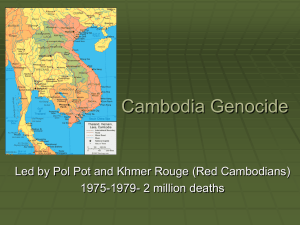
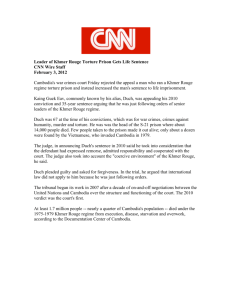
![Cambodian New Year - Rotha Chao [[.efolio.]]](http://s2.studylib.net/store/data/005298862_1-07ad9f61287c09b0b20401422ff2087a-300x300.png)
